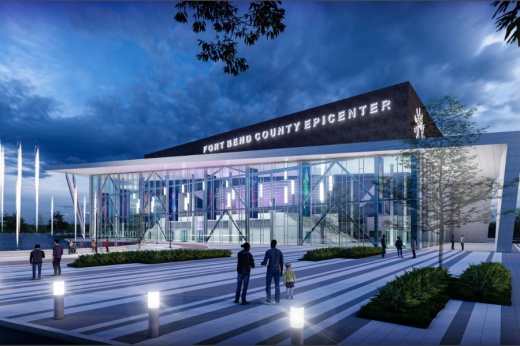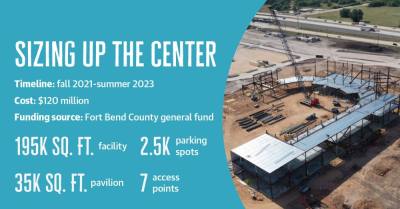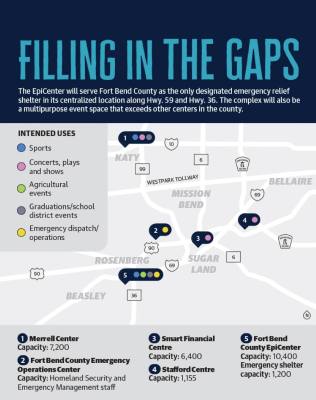Located in the heart of Fort Bend County along Hwy. 59 and Hwy. 36, County Judge KP George said he anticipates the EpiCenter will bring millions to the county over the next decade in the form of venue rentals, hotel stays, naming rights and a draw to new businesses in the surrounding area.
“One beautiful thing is this facility is located in the middle of Fort Bend County; that is why we are calling it the EpiCenter,” he said.
In February 2021, the county opted to enter a public-private partnership with site developer Stonehenge Holdings LLC to lease the multipurpose building with the intention of eventually owning it, George said. The operational costs will be paid for through events at the facility, he said.
Work began on the center in late 2021 and is estimated to cost more than $120 million. Construction costs are funded by the county and Stonehenge Holdings. In late July, the county also entered into an asset management agreement with the firm to provide $27 million for the facility’s pre-operation costs—a decision that was met with pushback from Precinct 3 Commissioner Andy Meyers, who represents Sugar Land and Missouri City.
At the July 26 Fort Bend County Commissioners Court, Meyers expressed apprehension for the county to shoulder the burden of cost with no share from the city of Rosenberg. His concerns were the lack of shared costs—a custom for other centers in the county, like the Smart Financial Centre in Sugar Land; rising inflation rates; and a shifting economy, especially since the project was approved in 2021.
Still, Meyers and other officials agreed the EpiCenter will benefit the county directly and indirectly.
A feasibility study conducted in 2017 by strategic planning firm Convention Sports and Leisure determined four main uses for the center: sports tourism, agricultural events, use by local school districts and emergency management.
Stonehenge founder and CEO Kevin Matocha projects the complex will quickly become an economic asset to the county.
“When you look at the debt service the county will pay versus the indirect impact that it will make to the county, it’s a great investment for the county,” Matocha said.
Serving county needs
The 230,000-square-foot complex is designed to hold space for sporting competitions, graduations, and agricultural events such as the Houston Livestock Show and Rodeo. The center will include a main event arena with an up to 10,400 seating capacity, an outdoor pavilion and plaza with a fountain. The facility will fill a gap in the county, George said.
“Fort Bend County does not have an event facility [or] a facility where our kids could go graduate,” George said. “Our children go to the Toyota Center to graduate from Fort Bend County. We do not have [a] facility available with a capacity of 10,000 or more.”
Matocha said sports tourism is a growing industry across the U.S. With families traveling long distances for their children to compete, he expects this will “put visiting heads in beds” and create the need for restaurants and retail in the surrounding area.
“The indirect impact of events associated with sports tourism is enormous,” he said. “The projections are showing between around $18 million a year progressing up to about $25 million a year.”
Additionally, the Houston Livestock Show and Rodeo was involved in the project’s development and will occupy the facility a couple of weeks out of the year, Matocha said. Agricultural event coordinators can also utilize the nearby Fort Bend County Fairgrounds for more expansive shows, he said.
More than 23 million jobs—17% of the civilian workforce—are involved in some facet of American agriculture, making it the nation’s largest employer, according to the U.S. Department of Agriculture.
School districts such as Lamar CISD and Fort Bend ISD could also use the EpiCenter for graduations, sporting competitions, teacher meetings, convocations and other events throughout the year, Matocha said.
Matocha added the design and larger capacity of the EpiCenter will only enhance other facilities within the county, including the Smart Financial Centre in Sugar Land and the Merrell Center located on Katy ISD grounds, and was not intended to compete with them.
“Smart Financial has a different design and smaller footprint,” he said. “From a sporting events standpoint, it is not designed for that. It’s designed for more concert venues. ...The Merrell Center would have more concerts, smaller graduation groups and is not really designed for agriculture events.”
In addition to the entertainment and community attractions that will stimulate small businesses, the EpiCenter can also be converted into an emergency shelter in the case of extreme weather events, Matocha said. This was particularly important to county officials who were involved in the feasibility study in 2017 while considering the impacts of Hurricane Harvey.
Emergency management
County officials were adamant the EpiCenter also has the capacity to shelter residents during natural disasters, such as Hurricane Harvey and the February 2021 winter storm, Matocha said.
Officials with the Fort Bend County Office of Homeland Security & Emergency Management said there are no emergency shelters operating in the county.
When Hurricane Harvey hit in August 2017, churches and schools were utilized for disaster relief but not to the scale of sheltering 1,200 people as planned for the EpiCenter, said Mary Staff, the public information officer for emergency management.
“Obviously for the size and the ability that this structure will have within the actual county, there is nothing comparable,” she said.
Aside from emergency shelter, Matocha said the EpiCenter could be used as a cooling and warming center in extreme weather events as well as a temporary emergency operations center due to its backup generators. During the planning stage for this project, creating more resources for disaster relief for county residents was of particular importance to commissioners, he said. Especially considering the impacts of Hurricane Harvey.
“[Emergency management resources] were one thing all the commissioners certainly had on their mind as well as how could this facility accommodate people in times of need,” Matocha said. “It was certainly a well researched item and something that we wanted to be able to provide as well.”
Its location on the egress of Hwy. 59 and Hwy. 36 makes the EpiCenter prime to provide shelter and other relief efforts, Staff said. She noted the National Guard was staged at the county fairgrounds during Harvey and that it was one of the only areas that did not flood.
“From an emergency management perspective, the Fort Bend Fairgrounds is the highest terrain in Fort Bend County,” she said. “Those roadways are [also] very helpful, especially when you’re getting resources in and out of the area. So, obviously, it being that close to those major thoroughfares is a bonus.”
Fiscal responsibilities
George and Commissioners Grady Prestage of Precinct 3 and Vincent Morales of Precinct 1—where the EpiCenter will be anchored—have all spoken to the long-term economic impacts of the $120 million complex.
But Meyers—though he was in agreement this complex will be an asset—said he is not certain the cost will be worth the benefit.
“I’m very prudent when it comes to spending taxpayers’ money and trying to make sure we do it efficiently and effectively,” Meyers said. “I want to be certain we are spending money on the things our citizens want in the way of service.”
Matocha and Eric Sullivan, a partner with Sports Facilities Cos., which will operate the EpiCenter, presented financial performance projections over the next 10 years at a July 22 Commissioners Court meeting.
Meyers said it was misleading that the presentation did not include the county’s lease payments on the building, which will start at $4.3 million annually until 2025 and increase to $6.4 million annually through the term of the lease ending in 2050.
However, Sullivan said the county’s lease payments are considered a capital expense and not included in the operational costs of the EpiCenter. The presentation, he said, summarized the expenses and revenue directly associated with the center. Naming rights—which have yet to be determined—were also not included in the summary, he said.
The financial performance summary showed the EpiCenter will become profitable in the third year of operation, starting at over $64,000 in profits and increasing to just under $300,000 by year 10, according to Sports Facilities Cos. Revenues from the EpiCenter will begin reimbursing the county in the fourth year, County Auditor Ed Sturdivant said at a July 12 meeting.
Additionally, economic impact figures show the center will bring in approximately $11 million in revenue in its first year and more than $22 million by the 10th year.
The economic impact is calculated from a percentage of people who are expected to come from two hours outside of Fort Bend County, spend a day and a night in the area, purchase hotel stays and patronize businesses near the EpiCenter, Sullivan said.
Meyers said he had some qualms about the county opting for a public-private partnership instead of a bond, which requires voter approval. The agreement with Stonehenge Holdings will cost the county an additional $44 million over the 30-year term of the lease, he said.
Another reason he said he did not agree to fund the land purchase, the lease of the building and operating costs through a public-private partnership is because some constituents feel the county moved forward with the EpiCenter “behind their back, so to speak” by not funding the project through a bond, which requires voter approval.
On the other hand, George said, the decision for a public-private partnership assured construction could begin sooner than if it were posed for a bond and that no taxpayer dollars will be used for the operation costs of the EpiCenter. Instead, the county’s general fund will provide cash flow for the EpiCenter’s operations until its reserve is significant enough to cover expenditures.
“Citizens do not have to come up with the money right up front,” George said. “That is actually absolutely a good deal. We are providing the land, and the developer is building this facility and giving it to us, and then we will pay it off in the next 30 years.”







